After initial success, the German offensive to relieve Stalingrad ran into strong resistance this week. Hitler stubbornly refused to allow the Sixth Army trapped inside the city to try to break out, but the Luftwaffe was unable to airdrop anything like enough supplies. One reason for this was the need for aircraft to keep Rommel’s forces supplied in Tunisia, as they continued to retreat before the advancing Eighth Army. Also this week, on 15 December American and Australian forces drove the Japanese out of Buna, New Guinea.
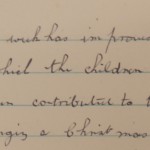
Back in Caithness, Thrumster School had successfully harvested its own potato crop. As the head teacher noted in the log book on 18 December, “The potatoes which the children planted has realised 18 shillings which has been contributed to the W.R.I. [Women’s Rural Institute] who are very kindly arranging a Christmas Treat for the children.”
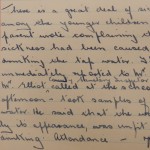
Things were not going so well in Bilbster School, however: “There is a great deal of sickness among the younger children. One parent wrote complaining that the sickness had been caused through drinking the tap water. This was immediately notified to Mr McHardy [Director of Education]. Mr Elliot, County Sanitary Inspector, called at the school on Tues. afternoon – took samples of the water. He said that the water, judging by its appearance, was unfit for drinking.”
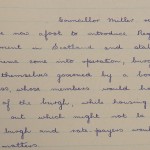
Meanwhile, Thurso Burgh Council was unhappy about the suggestions for regionalisation of local government in Scotland. Councillor Miller “stated that should such a scheme come into operation, burghs like Thurso would find themselves governed by a body operating from Inverness, whose members would have no idea of the needs of the burgh”. The Council agreed to send a resolution to the Convention of Scottish Burghs to “give a quietus” to such a scheme.
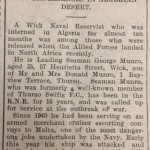
Finally this week, the John O’Groat Journal reported the story of Leading Seaman George Munro from Henrietta Street in Wick. He had served on the dangerous Malta convoys and his ship had been attacked, finally sinking in Malta harbour. Along with the rest of the crew, Seaman Munro returned as a passenger in another ship, but it was torpedoed and ran aground on the coast of French Algeria. The navy men were interned by the Algerian authorities and sent to an internment camp in the desert: “For the first six months the conditions – heat, and lack of proper food and clothing – affected the men’s health.”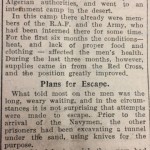
The other prisoners had already begun digging an escape tunnel and the new arrivals 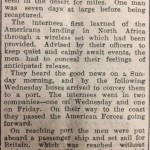 joined in: “Eventually a long tunnel, stretching beyond the camp, had been dug. Twenty-nine men escaped by means of the tunnel, but all were recaptured within a few days. Their chance of complete escape was dark; they could be seen in the desert for miles.” Fortunately the recent American-led invasion of North Africa, Operation Torch, led to men finally being released. Seaman Munro was now back in Wick, “enjoying a well-earned month’s leave.”
joined in: “Eventually a long tunnel, stretching beyond the camp, had been dug. Twenty-nine men escaped by means of the tunnel, but all were recaptured within a few days. Their chance of complete escape was dark; they could be seen in the desert for miles.” Fortunately the recent American-led invasion of North Africa, Operation Torch, led to men finally being released. Seaman Munro was now back in Wick, “enjoying a well-earned month’s leave.”
